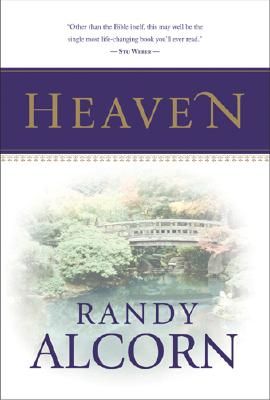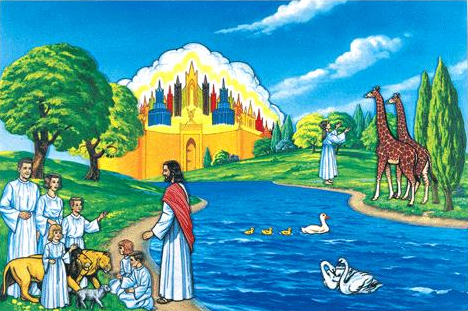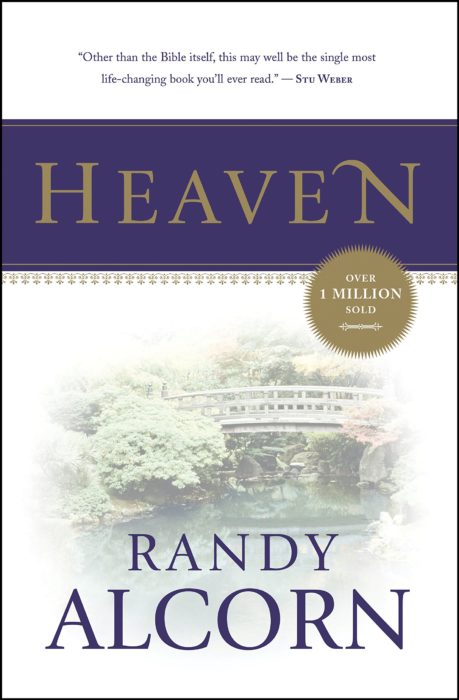In ‘Heaven’, Randy Alcorn Explores Biblical Imaginations Of New Earth
Since I read Randy Alcorn’s nonfiction hardback Heaven in summer 2006, I will not only admit but proclaim this: I have become a Heaven geek. And I don’t mean just the book.
Since then I have concluded that longing for Heaven — or really for the New Heavens and New Earth — is crucial to Biblical delight and discernment in speculative stories, dreams of fantastic other worlds, and really anything relating to cultural engagement.
My own renewed afterlife “fandom” began in summer 2001. I was reading the late Henry Morris’s speculations about the after-world and what we might do, in his commentary The Revelation Record. It was mostly pre-trib, pre-mill prophecy stuff, including several ideas with which I now disagree. But finally the late Dr. Morris (he was a pioneer of the modern creation-science and apologetics movement) got past the Beast and Gog and Magog and all that. He actually wrote about the point of Revelation, and with just a bit of speculation:
We shall have an eternity of time to explore and discover the secrets of an infinitely varied and limitless cosmos. Perhaps each of us will be assigned an entire galaxy to explore and develop for the glory of God. Then each will share with the others what he has found and what he has accomplished and all will rejoice together.
To me this idea seemed less like clear Scripture and more like science fiction.
Years later for me, Alcorn’s work built on that golden foundation.
 In Heaven, Alcorn, a pastor and author of both nonfiction and fiction, writes not only based on solid Scriptural truths about the future world for which God’s people are meant, but with Bible-based imagination. As he clearly affirms, imagination is God’s gift, yet it must be based on Biblical truth revealed by the only One Who can imagine anything into reality.
In Heaven, Alcorn, a pastor and author of both nonfiction and fiction, writes not only based on solid Scriptural truths about the future world for which God’s people are meant, but with Bible-based imagination. As he clearly affirms, imagination is God’s gift, yet it must be based on Biblical truth revealed by the only One Who can imagine anything into reality.
This book, along with Desiring God by John Piper, really did “change my life” in the way people hear about sometimes, even back in 2006 when I read it for the first time. Now, since re-reading Heaven multiple times, I can eagerly agree with Alcorn’s back-cover quote:
The next time you hear someone say, “We can’t begin to imagine what Heaven will be like,” you’ll be able to tell them, “I can.”
‘New Earth’ means New Earth, not New ‘Twilight Zone’
Unlike other Christian authors who may assume unbelieving readers already know the basics, Alcorn begins with a carefully written chapter to inform some readers that they are actually headed by default for Hell. Alcorn knows his audience, and the fact that some among them will be non-Christians who assume that a pleasant afterlife is theirs by default.
From there he heads into more assumption-challenging that continues throughout the book.1 In the first several chapters he hits hard against popular Churchian legends about the afterlife. Heaven is not only the present-day “intermediate” Heaven where the redeemed go upon death, Alcorn writes, but will in the future become the New Heavens and New Earth (Rev. 21).
Many people don’t seem to get that, and I don’t mean only non-Christians. Wrong notions of Heaven are just as common in the Church. Some Christians, if they think about it, assume Heaven is a nonmaterial world of spiritoid2 weirdness. They may even suspect that life there will be dull and boring, and that we may even lose individuality.
One example: a family member of mine directly believed she would not recognize saved family members in Heaven, and suspected that this New-Age notion was more “spiritual.”
In other words, this eternal “Heaven” is more like another dimension — a dimension of sound, a dimension of sight, a dimension of mind. But those who go to this “Heaven” have not crossed over into Scripture’s promised resurrected life, but into the Twilight Zone! Yet for comfort, or to assure ourselves that this view is spiritual, we may believe that this is not at all creepy, no, it’s all a good sort of nonphysical spiritoid-ness, and we’ll love it anyway.
Related ideas float around in Christendom more often than Scriptural support for them: Well, we have no way to know much about heaven. Or, We’re not sure what kind of bodies we’ll have in heaven. Or this one: In heaven, time (or work) will be no more.
Sprinkled in Alcorn’s chapters are similar quotes and testimonies from theologians who flat-out stated, apart from Biblical support or with out-of-context verses, certain “facts” about the eternal state. He also includes quotes from friends and Christians who secretly admitted they wished Heaven were more like Earth. The (supposed) fact that it won’t be like Earth frightened them. But in reply, Alcorn shows how Scripture endorses this desire, contending that this longing is not sinful or unspiritual, but an example of God reflecting resurrection truth and setting eternity in our hearts. He points readers to the truth that God will resurrect not only His people from death, but the rest of His material creation.
By calling the New Earth Earth, God emphatically tells us that it will be earthly, and thus familiar. Otherwise, why call it Earth?
When Scripture speaks of a “new song,” do we imagine it’s wordless, silent, or without rhythm? Of course not. Why? Because then it wouldn’t be a song. If I promised you a new car, would you say, “If it’s new, it probably won’t have an engine, transmission, doors, wheels, stereo, or upholstery”? If a new car didn’t have these things, it wouldn’t be a car. If we buy a new car, we know it will be a better version of what we already have, our old car. Likewise, the New Earth will be a far better version of the old Earth.
The word new is an adjective describing a noun. The noun is the main thing. A new car is first and foremost a car. A new body is mainly a body. A New Earth is mainly an Earth.
The New Earth will not be a non-Earth but a real Earth. The Earth spoken of in Scripture is the Earth we know — with dirt, water, rocks, trees, flowers, animals, people, and a variety of natural wonders. An Earth without these would not be an Earth.
Too much imagination?
Some may be distracted or bemused by Alcorn’s quotes from The Chronicles of Narnia books, or the Lord of the Rings novel or even films, and even Star Trek. But as a fan of epic stories that remind me of God, His people and His world, such references speak to me.
Yet any fantasy quotes only serve as reflections of or contrasts to Biblical exposition.3
Joy, feasting, art, science, exploration, endless wonder …
Whether they believe in a “spiritoid” “body” in a Twilight-Zone-esque “heaven,” still many Christians wonder about questions like this: Will we feast and have fun? Will there be pizza in Heaven? What about art and science? When I wondered these, I tried not to think beyond those questions. Rather, I thought this was somehow no big spiritual deal, and moved on.
Alcorn believes many such Christians mean to be humble and not presumptuous. Of course we don’t know everything there is to know about what God will have for us in Heaven. But God has revealed plenty for us in Scripture, he writes. Putting this in perspective, we begin to sort through the lingering wrong ideas about Heaven that have come not from the Bible, but from “Christoplatonism.” Heaven’s appendix A about those often-subtle notions is alone worth the book’s price — in short, it’s Alcorn’s term for a series of beliefs derived from Greek philosophy and old denials of the doctrine of Resurrection, which imply or claim only the unseen “spiritual” is spiritual, and created matter does not matter to God.
Thus, after setting up a more-Biblical foundation for understanding New Earth, Alcorn tackles many of these very questions — including the coffee, pets, and pizza. Once wrong preconceptions are cleared away, it’s indeed astonishing what we do know, not necessarily about the real yet intermediate Heaven, but about the promised New Earth.
These many subtopics take up the rest of the book: not with only opinions or speculations about the New Heavens and New Earth, but Biblical foundations for those ideas. So far I have not found any false doctrine. Alcorn invites readers to hold his words up to those of Scripture and even contact him if they’ve spotted a wrong or unsupported statement. 4
Alcorn mines Scriptures from Revelation, prophets minor and major, and other books for descriptions of not only the intermediate Heaven, but the New Heavens and New Earth. For example, from Revelation 6, specifically verses 9 through 11, he exegetes several facts that challenge several beliefs even about the present-day Heaven:
- These people were individuals who had been persecuted and killed on Old Earth.
- They remembered their former lives on Old Earth, though they had been persecuted and killed! Not exactly pleasant memories, those. Yet there in Heaven, they remember. Why is this? Well, we know that God is glorified in suffering.
- Even while in Heaven, the people are waiting for God to bring things to completion.
- And by the way, time certainly exists even in the existing Heaven (not yet the New Earth) — after all the martyrs were “told to rest a little longer.”
Further chapters take on related topics. Will we eat meat, or anything? What about coffee? What kinds of abilities may our bodies have? Will we explore, discover new creatures, perhaps go on journeys in space or even time? And what about pets who have died?
 Alcorn does not skip past these issues with “Scripture is silent here.” Rather, he points out God’s axiom of glorifying Himself as His chief end (with plenty of John Piper quotes) and asks why God would not allow something. Given God’s original post-creation mandate in Genesis, commanding Adam and Eve to manage and explore planet Earth — it would make no sense for Him to halt a space program, the practice of science, or the drinking of coffee.
Alcorn does not skip past these issues with “Scripture is silent here.” Rather, he points out God’s axiom of glorifying Himself as His chief end (with plenty of John Piper quotes) and asks why God would not allow something. Given God’s original post-creation mandate in Genesis, commanding Adam and Eve to manage and explore planet Earth — it would make no sense for Him to halt a space program, the practice of science, or the drinking of coffee.
And as for pets, Alcorn asks: if God were to bring back specific beloved pets who died on Old Earth, would He not be glorified more in the happiness and praise of His people?
I cannot highly enough recommend Heaven. Alcorn’s work has helped me re-realize not only how big God is — to save His universe, not just His people — but refocus on Biblical exegeses and discerning false ideas. Scripture is clear: God will not just nuke His whole creation from orbit and start over with some “spiritual” world. Rather, He will redeem His physical universe and make it more incredible than ever before.
- Some have said Alcorn seems too redundant in doing that, though I argue that rebuttals to long-held un-Biblical beliefs often need to be this redundant. ↩
- My word, not Alcorn’s. ↩
- I’ve only found one error in Heaven: Alcorn’s attribution of a Star Trek: Voyager plotline to Star Trek: The Next Generation. For those who want to know, he was referencing the episode in which Q tells Captain Janeway that he is getting bored in his “Q continuum” existence. ↩
- And I understand the book has gone through a few revisions to add needed clarity. ↩








































The original series of columns on this topic that was posted on this site a long time ago gave me a breakthrough, and I agree with the premise whole-heartedly.
However, I think the “Platonic” notion of an unseen spiritual reality is also valid. (I’m only using the word “Platonic” because that term has been used; I’ve never studied Plato.) A book I read from my college’s library, Faith and Reason by Nells Ferre (which seems to be out-of-print and hard to find online), presents a Christian philosophy based on the idea that the highest moral ideal is also the truest and the most real thing. I also found that thought to be a personal breakthrough. So, I do think there is an unseen reality that has not yet been actualized in our experience. The historical life of Jesus Christ was the descent of that transcendent reality into our existence, and the full realization of that transcendent reality awaits the final resurrection of the New Earth and Heavens.
I’m just saying this because I would hate the influence of Alcorn’s rediscovered vision of the New Earth to ban or belittle allusions such as these lines from Tolkien’s amazing poem “Mythopoeia”:
I think the purpose of all art and creativity is to expresses a facet of the unseen truth that is more real than our reality. And the coming New Earth is more real than this old Earth. It is the True Earth.
Loved your comment, brother. It reaches in and helps me with a “breakthrough” also, because of things such as my love for C.S. Lewis’s vision of a new, “truer” Narnia in The Last Battle, but my uncertainty about the story’s citation of Plato for the idea.
Lewis himself believed that “God likes matter; He invented it,” and proved this in his fantastic and nonfiction writings. Here I think he “redeems” Plato in the same way he redeemed Bacchus and Silenus in Prince Caspian. (I have not read Plato directly either, so I’m open to correction here.) Apparently Plato was flawed in believing that seen reality doesn’t matter, but definitely onto something with his idea that unseen realities matter more. That’s not “Gnosticism,” that’s plainly Scriptural, such as in the book of Hebrews’s emphasis that the temple was based on the Heavenly template — cross-reference Ephesians 5 about human marriage based on Christ’s.
Perhaps it might be as simple as saying, as you did, that yes, the coming New Earth is certainly “more true” and “more solid” than this old Earth. New Earth is more real not because it is “spiritual” or merely allegorical, but because it is weightier. And it’s unseen not by nature, but simply because of time.
That makes sense.